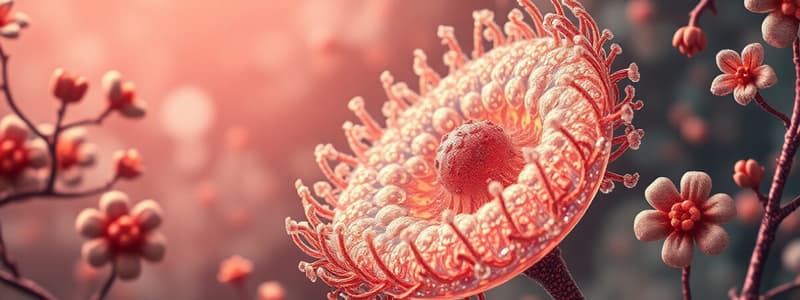Podcast
Questions and Answers
Which term describes a process where certain traits increase in frequency because they provide a survival or reproductive advantage?
Which term describes a process where certain traits increase in frequency because they provide a survival or reproductive advantage?
- Negative selection
- Positive selection (correct)
- Genetic drift
- Niche construction
What is the process called where a population's genetic variations change due to random sampling of organisms?
What is the process called where a population's genetic variations change due to random sampling of organisms?
- Natural selection
- Gene flow
- Genetic drift (correct)
- Directional selection
Which of these terms is associated with the idea that minor changes in development can lead to significant evolutionary changes over time?
Which of these terms is associated with the idea that minor changes in development can lead to significant evolutionary changes over time?
- Developmental bias (correct)
- Evolution
- Founder effect
- Extended Evolutionary Synthesis
Which hypothesis states that most evolutionary changes are the result of the accumulation of small genetic variations?
Which hypothesis states that most evolutionary changes are the result of the accumulation of small genetic variations?
What term is used to describe the phenomenon where a new population starts from a small number of individuals, leading to reduced genetic variation?
What term is used to describe the phenomenon where a new population starts from a small number of individuals, leading to reduced genetic variation?
What term describes the shared characteristics inherited from a common ancestor?
What term describes the shared characteristics inherited from a common ancestor?
Which concept describes a group of organisms that can interbreed and produce viable offspring?
Which concept describes a group of organisms that can interbreed and produce viable offspring?
What type of speciation occurs when populations are geographically isolated?
What type of speciation occurs when populations are geographically isolated?
Which term refers to the observable differences between males and females of the same species?
Which term refers to the observable differences between males and females of the same species?
Which evolutionary model proposes that species experience short bursts of rapid change followed by long periods of stability?
Which evolutionary model proposes that species experience short bursts of rapid change followed by long periods of stability?
Which term refers to the process by which organisms better adapted to their environment tend to survive and produce more offspring?
Which term refers to the process by which organisms better adapted to their environment tend to survive and produce more offspring?
What is the term for the change in the genetic composition of a population due to chance events?
What is the term for the change in the genetic composition of a population due to chance events?
Which type of selection increases the frequency of a trait that is beneficial for reproduction?
Which type of selection increases the frequency of a trait that is beneficial for reproduction?
Which scientist is most associated with the theory of evolution through natural selection?
Which scientist is most associated with the theory of evolution through natural selection?
What term describes the movement of genes between populations due to migration?
What term describes the movement of genes between populations due to migration?
What term describes a cell that contains a nucleus and organelles?
What term describes a cell that contains a nucleus and organelles?
Which of the following nucleotides pairs with Guanine during DNA replication?
Which of the following nucleotides pairs with Guanine during DNA replication?
What is the general process of DNA replication primarily responsible for?
What is the general process of DNA replication primarily responsible for?
Which of the following components is considered an organelle?
Which of the following components is considered an organelle?
What defines whether a cell is diploid or haploid?
What defines whether a cell is diploid or haploid?
What is the term for changes in gene expression that do not involve alterations to the underlying DNA sequence?
What is the term for changes in gene expression that do not involve alterations to the underlying DNA sequence?
Which of the following describes the concept that traits acquired during an organism's lifetime can be passed onto the next generation?
Which of the following describes the concept that traits acquired during an organism's lifetime can be passed onto the next generation?
Which mechanism involves the addition of a methyl group to DNA, often repressing gene expression?
Which mechanism involves the addition of a methyl group to DNA, often repressing gene expression?
What term describes the variability in expression of genes depending on environmental conditions and developmental stages?
What term describes the variability in expression of genes depending on environmental conditions and developmental stages?
Which system of naming organisms uses a two-part Latin name to uniquely identify species?
Which system of naming organisms uses a two-part Latin name to uniquely identify species?
Which concept explains that all species arise from a common ancestor?
Which concept explains that all species arise from a common ancestor?
What is one major factor that drives the process of evolution?
What is one major factor that drives the process of evolution?
Which theory suggests that organisms can acquire traits during their lifetime and pass them on to their offspring?
Which theory suggests that organisms can acquire traits during their lifetime and pass them on to their offspring?
What is a significant implication of the Earth being old in terms of evolution?
What is a significant implication of the Earth being old in terms of evolution?
Which concept refers to the disappearance of a species from Earth?
Which concept refers to the disappearance of a species from Earth?
What is the primary function of mRNA in the process of protein synthesis?
What is the primary function of mRNA in the process of protein synthesis?
What differentiates a haploid cell from a diploid cell?
What differentiates a haploid cell from a diploid cell?
Which of the following statements correctly defines transcription?
Which of the following statements correctly defines transcription?
What occurs during recombination (crossing over) in meiosis?
What occurs during recombination (crossing over) in meiosis?
What distinguishes somatic mutations from germ-line mutations?
What distinguishes somatic mutations from germ-line mutations?
What describes traits that have evolved specifically in a group of primates and differ from their ancestors?
What describes traits that have evolved specifically in a group of primates and differ from their ancestors?
What are Plesiadapiformes primarily categorized as?
What are Plesiadapiformes primarily categorized as?
Which factor is least likely to affect primate social structure?
Which factor is least likely to affect primate social structure?
Which type of primate locomotion involves movement primarily atop branches or tree trunks?
Which type of primate locomotion involves movement primarily atop branches or tree trunks?
Which of the following traits would you classify as ancestral in primates?
Which of the following traits would you classify as ancestral in primates?
What is the main difference between a simple trait and a complex trait?
What is the main difference between a simple trait and a complex trait?
In a Punnett square, what does the term 'allele' refer to?
In a Punnett square, what does the term 'allele' refer to?
Which statement best describes the function of sex chromosomes?
Which statement best describes the function of sex chromosomes?
What is the purpose of a pedigree chart in genetics?
What is the purpose of a pedigree chart in genetics?
Which of the following best characterizes homozygous alleles?
Which of the following best characterizes homozygous alleles?
Which field of study primarily focuses on human evolutionary characteristics and cultural practices?
Which field of study primarily focuses on human evolutionary characteristics and cultural practices?
Which of the following best describes the primary focus of human biology?
Which of the following best describes the primary focus of human biology?
Anthropology encompasses which of the following areas of study?
Anthropology encompasses which of the following areas of study?
Which of the following aspects is NOT part of human biology?
Which of the following aspects is NOT part of human biology?
How does the study of anthropology contribute to understanding human biology?
How does the study of anthropology contribute to understanding human biology?
Flashcards are hidden until you start studying
Study Notes
General Scientific Concepts
- The scientific method is a process used to understand and explain the natural world
- Primary literature is the original source of new scientific information
- Secondary literature is a summary or interpretation of primary literature
- In the article “The Forgotten Father of Epigenetics”, the main message is that the work of Conrad Waddington (1905-1957) was overlooked in the field of epigenetics
Cellular Components
- Prokaryotes are single-celled organisms lacking a nucleus and other membrane-bound organelles
- Eukaryotes are organisms with a nucleus and other membrane-bound organelles
- Organelles are specialized structures within cells that perform specific functions
- The nucleus is a membrane-bound organelle that contains the cell's genetic material (DNA)
Molecular Biology
- DNA is a nucleic acid that carries genetic information
- Mitochondria are organelles responsible for cellular respiration
- Ribosomes are organelles responsible for protein synthesis
- mtDNA is the genetic material found in mitochondria
- Somatic cells are any biological cells forming the body of a multicellular organism other than gametes, germ cells, gametocytes or undifferentiated stem cells
- Gametes are sex cells; sperm and egg
Nucleotides
- Adenine, guanine, cytosine, and thymine are the four nitrogenous bases found in DNA
Genetic Processes
- DNA replication is the process by which a DNA molecule is copied
- A gene is a segment of DNA that carries the code for a specific protein
- Diploid cells have two sets of chromosomes (one from each parent)
- Haploid cells have one set of chromosomes
- Chromatin is the complex of DNA and proteins that make up chromosomes
- A chromosome is a thread-like structure of nucleic acids and protein found in the nucleus of most living cells, carrying genetic information in the form of genes
- Homologous chromosomes are pairs of chromosomes that have the same genes at the same loci
Left Column
- An autosome is a chromosome that is not a sex chromosome
- A sex chromosome is a chromosome that determines the sex of an individual
- An allele is a variant form of a gene
- A locus is the specific location of a gene on a chromosome
- A complex trait is a trait that is influenced by multiple genes and environmental factors
- A simple trait is a trait that is influenced by a single gene
- Genotype is the genetic makeup of an individual
- A dominant allele is an allele that masks the expression of a recessive allele
- A recessive allele is an allele that is only expressed when two copies are present
- A homozygous genotype has two identical alleles
- A heterozygous genotype has two different alleles
Right Column
- A Punnett square is a diagram used to predict the possible genotypes and phenotypes of offspring
- ABO blood groups are a blood type system based on the presence or absence of certain antigens on red blood cells
- Codominance is a type of inheritance where both alleles are expressed equally in the heterozygote
- The Human Genome Project was an international effort to map the entire human genome
- Sex is a complex trait that is influenced by multiple genes and hormones
- Gender is a socially constructed category that refers to the roles, behaviors, and identities that are considered appropriate for men and women
- Gonads are the sex organs that produce gametes (sperm and eggs)
- Sex steroids are hormones that regulate sexual development and function
- DSD (Disorders of Sex Development) are conditions that involve atypical development of sex chromosomes, gonads, or genitalia
- A pedigree chart is a diagram that shows the inheritance of a trait within a family
Primate Traits
- Ancestral traits are traits that are present in the common ancestor of a group
- Derived traits are traits that have evolved since the common ancestor of a group
Plesiadapiformes
- Plesiadapiformes were a group of early primate-like mammals that lived during the Paleocene epoch
- Plesiadapiformes are considered potential ancestors of modern primates
Types of Primate Locomotion
- Quadrupedalism: Locomotion using all four limbs
- Arboreal Quadrupedalism: Locomotion on all four limbs in trees
- Terrestrial Quadrupedalism: Locomotion using all four limbs on the ground
- Brachiation: Locomotion using the arms to swing from branch to branch
- Leaping: Locomotion using powerful hind limbs to jump between branches or trees
- Bipedalism: Locomotion using only the hind legs to walk or run (humans are the ultimate bipeds)
Factors That Affect Primate Social Structure
- Food availability
- Predation pressure
- Competition for mates
- Group size
- Social intelligence
- Resource defense are all factors that can affect primate social structure
Studying That Suits You
Use AI to generate personalized quizzes and flashcards to suit your learning preferences.




